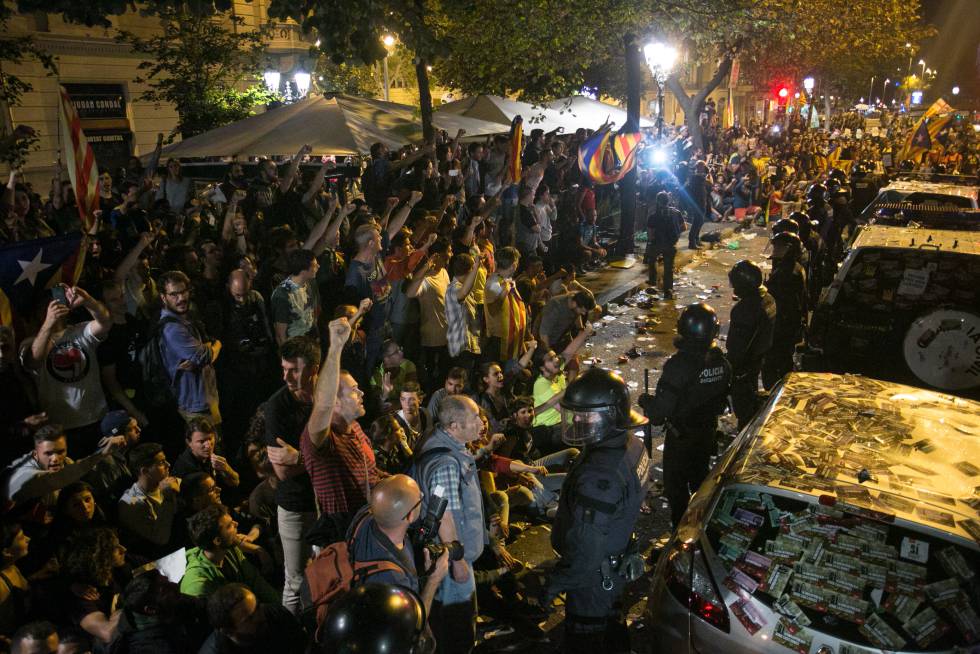As Mossos chief appears in court, just what is the offense of sedition?
The head of the regional police force is facing charges over his role during the Civil Guard operation in Catalonia in September
Madrid
The chief of the Catalan police, Josep Lluís Trapero, and three other people have been summoned to appear on Friday morning before Spain’s High Court, the Audiencia Nacional, which is investigating them for sedition.

Protests outside the Ministry of the Economy in Barcelona on September 20. ALBERT GARCIA
The charges against Trapero, his aide Teresa Laplana and the heads of two pro-independence civic groups (Jordi Sànchez of ANC and Jordi Cuixart of Òmnium) are the result of a complaint filed by prosecutors over these individuals’ role in the events of September 20.
On that day – and well into the early hours of September 21 – thousands of protesters congregated in front of the Barcelona building that houses the Catalan government’s department of economic affairs, to protest the arrests of several officials involved in organizing the illegal independence referendum of October 1.
The protest involved acts of vandalism against Civil Guard patrol cars, and hindered the work of officers who were inside the building in search of election material to confiscate. The judicial representative who was overseeing the court-ordered search was forced to leave the building from the rooftop.
Many jurists consider that sedition, which is considered a felony against public order, cannot be investigated by the High Court
Sedition is a crime that is practically unheard of in Spanish democratic history, even though its origins go all the way back to Roman law; it has been included in all of Spain’s criminal codes since 1822.
Sedition carries a maximum 15-year prison sentence for those who “publicly and tumultuously rise up to prevent, by force or outside the legal channels, application of the law, or any authority, official corporation or public officer from the lawful exercise of their duties, or implementation of administrative or judicial resolutions.”
But the wording of the definition and its position within the Spanish criminal code has led to disagreement among legal experts over what constitutes sedition, and whether it falls under the High Court’s jurisdiction.
A Supreme Court decision from October 1980 struck down a ruling by the Provincial Court of Huesca that had found local councilors guilty of sedition for making public calls to join a protest against a home eviction. Even though the protest never took place, the councilors were sentenced to three months for incitement to sedition.
In its ruling, the Supreme Court established that sedition is consummated when the tumultuous uprising takes place, regardless of whether it achieves its goal or not. This decision was based on a 1934 ruling stating that at least 30 people had to participate in the acts.
Outside Catalonia, there is an ongoing investigation into sedition over the air traffic controllers’ wildcat strike of 2010
The 1980 ruling defined “tumultuous” as something “chaotic, anarchical, inorganic and disorderly” although it did not preclude sedition in the case of an “organized and orderly” uprising.
Since then, the crime of sedition has hardly ever been considered by the courts. Actions to prevent the implementation of judicial decisions, even when committed by groups of people using force, have always been tried as crimes of disobedience, resistance or assaults on the authority.
Outside Catalonia, there is an ongoing investigation into sedition over the air traffic controllers’ wildcat strike of 2010, when the government was forced to close off airspace, decree the state of alarm and militarize control towers.
Many jurists consider that sedition, which is considered a felony against public order, cannot be investigated by the High Court, whose jurisdiction includes crimes “against the form of government.”
But investigating judge Carmen Lamela and the most recent doctrine issued by the court’s criminal division see it otherwise. The judge says that even though not all charges of sedition should be investigated by the High Court, this particular case also affects the form of government, as it is part of a secessionist drive to illegally declare independence and alter the organization of the Spanish state.
English version by Susana Urra.











.png)



























No hay comentarios:
Publicar un comentario